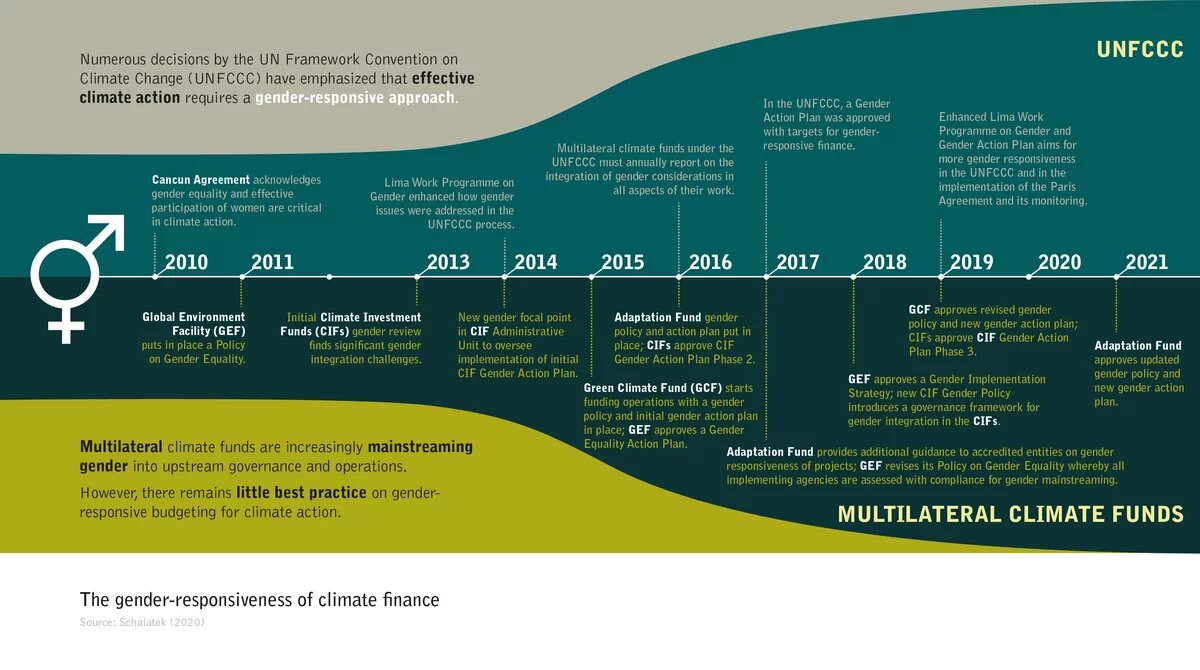
Among those hardest hit by the climate crisis, women have taken some of the leading roles in combatting it. On local levels they are directly addressing the effects of climate change. On the international level, feminist activists' persistent advocacy and networking have finally brought the global community to take gender-responsive climate policies into account. Here we present some of the core calls for fair and gender-equitable climate financing on a global scale.

The Cancun Agreement of 2010 emphasises the need for equal participation by women (we understand 'women' as a non-binary social category covering all people who identify with it) in climate negotiations. This has yet to be achieved. However, conferences under the United Nations Framework Convention on Climate Change (UNFCCC) have resulted in agreements like the Lima work programme (2014) and gender action plans (2017, 2019) that can be used at least to monitor progress toward socially responsible and gender-responsive climate policies for the international community. But the road is long and negotiations are often a struggle.
Climate financing: too little and not gender-equitable
On a global policy level, success in climate mitigation and adaptation depends to a crucial degree on major emitting countries' financial support for combatting the crisis in the global South. International climate funds are leading policy and monetary instruments for independent civil society organisations. These funds, however, need to be critically monitored. Above all, allocation needs to be co-determined. This is because climate financing is influenced by systemic but still unresolved questions of climate justice, which also include gender justice. Who decides how much money goes where? Are the amounts sufficient to offset increasing losses and damage? Do they take an overall approach that values human rights and livelihoods on a par with climate protection? And especially, do they also reach representatives of women and their organisations on local levels?
Actors and activists combat the climate crisis
To achieve climate justice, the requisite funding has to be gender-responsive. Gender activists have been working to integrate this into the UNFCCC process for many years now. Multilateral climate funds are incorporating gender-mainstreaming policies to a greater degree into their strategies for emissions reduction and adaptation, on both decision-making and operational levels. This is considered a prerequisite if allocated funds are to be effectively and sustainably gender responsive. Of special note here is the Green Climate Fund (GCF), which anchored gender mainstreaming into its founding documents and institutionalised a gender strategy and action plan in 2015 before even issuing its first project funds.
Despite this progress, a transformative and binding gender approach that covers all programme phases, work levels, fields of activity, and advisory and decision-making bodies has yet to be systematically established.
Liane Schalatek, the associate director of the hbs office in Washington, has worked for many years on macro-economic aspects of climate justice. Her feminist and civil society expertise in climate financing carries weight with climate funds and at climate negotiations. To put this specialised expertise on the 'climate funds' policy instrument to wider use in feminist advocacy – including this year's climate-focused negotiations by the UN's Commission on the Status of Women – we summarise key critiques of "incomplete gender mainstreaming" at climate-funding institutions and formulate core demands for global, fair and gender-responsive climate financing.
Key principles and actions for gender-responsive climate financing
Gender equality and women's empowerment must be recognised as guiding principles and as a cross-cutting mandate for all climate finance instruments. The gender approach must be rights-based, transformative and inclusive, and should be embedded in transparent and participatory institutional processes:
- A beneficiary and people-centred approach to adaptation and mitigation measures, paying particular attention to some of the small-scale and community-based actions in which women are over-represented and ensuring that the concessionality of public funding is passed to women as beneficiaries. In mitigation this means a focus on providing energy access via renewables as a way to address the persistent energy poverty of many women.
- Explicit gender criteria in performance objectives and results measurement frameworks and for the evaluation of funding options. Such criteria should include a mandatory gender analysis of the proposed project, a fully costed project-specific gender-action plan, a gendered budget and some clear quantitative and qualitative indicators measuring how funding contributes to gender equality objectives, as well as the systematic collection of gender-disaggregated data.
- Gender balance and gender expertise among all fund decision-making and advisory bodies to ensure that gender equality principles are integrated into all steps related to the development of funding and programming (accreditation, approvals, monitoring, reporting and evaluation).
- Special efforts to seek the meaningful input and participation of women as key stakeholders and beneficiaries in fund-related country coordinating mechanisms, such as investment plans and climate strategies.
- Gender-responsive funding guidelines, allocation criteria and financial instruments for each thematic funding window (adaptation and emissions reduction) and specific sectors (e.g. water and agricultural projects and forest protection), and the regular evaluation of their impacts.
- Approaches to increase the access of local women's groups (and for women entrepreneurs) to fund resources, such as through small grant approaches under enhanced direct access efforts to green credit lines.
In an extensive position paper for the Commission on the Status of Women, Liane Schalatek explains the actions the international community now needs to take to improve both the quality and scope of gender-responsive climate financing. Here we summarise key recommendations that address Germany's responsibility as a major donor country and climate mitigation actor:
-
After the first step of increasing its contribution to the Adaptation Fund (COP 26), Germany should substantially boost its adaptation funding (thus far comprising only around 20% of its climate financing). It should also begin providing funds to offset losses and damage in affected countries and communities.
-
In bilateral development and financial cooperation, priority should be placed on grants over loans. This is the only way for developing countries to retain their capacity to invest in national social security and health systems. Otherwise women bear the major burden of climate disasters and the breakdown of social welfare systems.
-
Donor countries like Germany should increase their percent contributions to multilateral climate funds with enhanced direct access for women and marginalised communities on local levels.
-
Adopt the target of having one-third of German climate financing available for direct access – to support women's and human rights organisations that have thus far not benefited sufficiently from the International Climate Initiative (IKI).
For true socially responsible and gender equitable climate financing there must be no private-sector investment subsidies, which foster profit-oriented and related climate projects such as monoculture reforestation, privatisation of energy and water infrastructure including land appropriation, restricted access to basic services, and violations of human rights. In this regard Germany should especially rethink its existing private-sector woodland protection subsidies.


